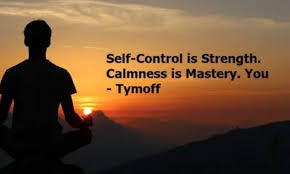In today’s fast-paced world, where emotions often run high and decisions are made in haste, one of the most valuable qualities a person can cultivate is self-control. The famous quote “Self control is strength, calmness is mastery” speaks volumes about the importance of emotional regulation and the power of inner peace. This quote, often attributed to the legendary philosopher and leader, Marcus Aurelius, encourages individuals to take control of their impulses and emotions to achieve greater success in life.
In this article, we will delve deeper into the meaning of this quote, explore the benefits of self-control and calmness, and discuss how you can apply these principles in your daily life.
Understanding the Meaning of “Self Control is Strength, Calmness is Mastery”
At first glance, the quote “Self control is strength, calmness is mastery” may seem like a simple statement, but its depth lies in its interpretation. Let’s break it down:
- Self-control is strength: This part of the quote emphasizes the idea that true strength comes not from physical power but from the ability to control one’s impulses, emotions, and reactions. Self-control is about having the discipline to act thoughtfully and avoid rash decisions. It’s the power to say no to immediate gratification for the sake of long-term goals.
- Calmness is mastery: The second part of the quote suggests that mastery over oneself is achieved through calmness. When we remain calm, we are not easily swayed by external circumstances or emotions. We can think clearly, make rational decisions, and navigate through challenges with composure. Calmness, therefore, is a form of mastery because it demonstrates control over the mind and emotions
Together, the quote reminds us that true strength is not about overpowering others but about mastering ourselves. By practicing self-control and cultivating calmness, we can overcome life’s challenges with poise and confidence.
Also Read: What Dinosaur Has 500 Today? A Deep Dive into the Mystery
The Benefits of Self-Control and Calmness
1. Improved Decision Making
When you practice self-control, you’re better able to think through your decisions rather than reacting impulsively. This leads to better choices in all areas of life, from personal relationships to career decisions. Calmness allows you to weigh the pros and cons of each situation without being overwhelmed by emotions, leading to wiser, more thoughtful decisions.
2. Increased Emotional Intelligence
Self-control is closely linked to emotional intelligence, which involves recognizing and managing your emotions and understanding the emotions of others. By maintaining calmness, you develop a higher level of emotional awareness, allowing you to respond to situations with empathy and understanding, rather than reacting out of anger or frustration.
3. Reduced Stress
When you’re able to control your emotions and remain calm in stressful situations, you’re less likely to experience anxiety and stress. This can lead to improved mental health, better physical health, and an overall sense of well-being. Self-control and calmness can act as powerful tools for managing life’s pressures.
4. Enhanced Relationships
Self-control and calmness play a significant role in building and maintaining healthy relationships. When you’re able to control your impulses and remain composed during disagreements or conflicts, you’re more likely to communicate effectively and resolve issues in a constructive way. This helps to foster trust, respect, and mutual understanding in your relationships.
How to Cultivate Self-Control and Calmness
1. Practice Mindfulness
Mindfulness involves being fully present in the moment without judgment. By practicing mindfulness, you can develop greater self-awareness and gain control over your thoughts and emotions. Techniques such as meditation, deep breathing, and visualization can help you remain calm in challenging situations.
2. Set Clear Goals
Having clear, defined goals gives you a sense of purpose and direction. When you know what you’re working towards, it becomes easier to resist distractions and impulses. Self-control thrives when you’re focused on a long-term objective, rather than seeking short-term rewards.
3. Learn to Pause Before Reacting
One of the most effective ways to practice self-control is to create a pause between stimulus and response. When you feel triggered by a situation, take a deep breath, count to ten, or simply walk away for a moment. This gives you the time to assess the situation rationally and choose your response carefully, rather than reacting impulsively.
4. Build Emotional Resilience
Emotional resilience is the ability to bounce back from adversity and cope with life’s challenges in a healthy way. By developing emotional resilience, you can better manage stress, setbacks, and difficult emotions. Resilient individuals tend to remain calm and composed even in the face of adversity, demonstrating mastery over their emotions.
Self Control is Strength, Calmness is Mastery: How It Transforms Your Life
When you apply the principle of “self control is strength, calmness is mastery” in your daily life, you begin to notice significant changes in the way you approach challenges. Whether it’s handling a stressful work situation, managing personal conflicts, or staying focused on your goals, the ability to maintain self-control and calmness allows you to approach life with confidence and clarity.
With time, you’ll find that your relationships improve, your mental and physical health strengthens, and your decision-making abilities sharpen. Mastering self-control and calmness gives you the tools to navigate life’s ups and downs with grace and poise.
FAQs
What is the meaning of “Self control is strength, calmness is mastery”?
This quote suggests that true strength lies in the ability to control one’s emotions and impulses, while calmness is a form of mastery that allows individuals to navigate challenges with clarity and composure.
How can self-control help me in life?
Self-control helps you make better decisions, manage your emotions, reduce stress, and improve relationships. It allows you to stay focused on long-term goals and resist the temptation of immediate gratification.
What are some ways to stay calm under pressure?
Practicing mindfulness, taking deep breaths, pausing before reacting, and focusing on your long-term goals can help you stay calm under pressure. Developing emotional resilience also plays a key role in remaining composed during challenging situations.
Can calmness improve my decision-making?
Yes, calmness enables you to think more clearly, weigh options carefully, and make more rational decisions. When you’re calm, you’re less likely to be swayed by emotions or external stressors, allowing you to make better choices.
How does emotional intelligence relate to self-control?
Emotional intelligence involves recognizing and managing your emotions, and self-control is a key aspect of this. By practicing self-control, you enhance your emotional intelligence, which helps you respond to situations with empathy and understanding.
Conclusion
“Self control is strength, calmness is mastery” is not just a powerful quote; it’s a timeless reminder of the importance of emotional regulation and inner peace. By practicing self-control and cultivating calmness, we can navigate life with greater clarity, resilience, and success. Whether you’re facing personal challenges, striving for professional growth, or simply looking to improve your well-being, mastering self-control and calmness is key to achieving lasting happiness and fulfillment.

